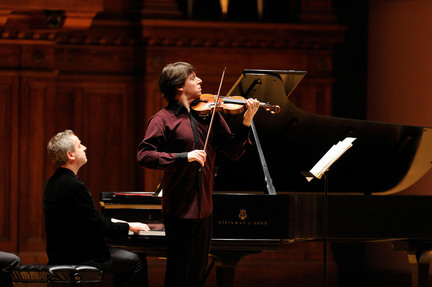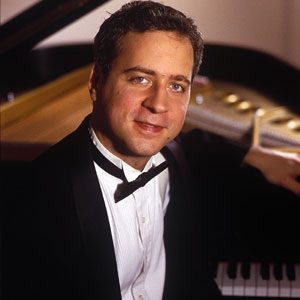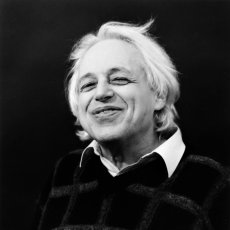Classical Music Interview: Pianist Jeremy Denk — Riding the Roller Coaster of Rhythm
Pianist Jeremy Denk says, “Being a musician can be very solitary and a bit navel-gazing (like blogging). I’m not sure that blogging made me saner, but it surely released a valve somewhere.”
By Susan Miron
Pianist Jeremy Denk will be tackling one of the year’s most challenging programs this Sunday at 1:30 p.m. at MassArt (where the Gardner Museum concerts are this season)—Bach’s Goldberg Variations and Book One and Two of Ligeti’s Etudes.
Known for his amazing technique and musical intelligence, Mr. Denk has recently released critically acclaimed CDs of the sonatas of Charles Ives and the Viola Sonatas of Brahms with violist Roberto Diaz. A longtime musical partner of violinist Joshua Bell, Mr. Denk writes a popular, thought-provoking blog on music and being a musician, ThinkDenk: the glamorous life and thoughts of a concert pianist.
==============================================================
Arts Fuse: When did you feel almost as compelled to write/blog as you felt about needing to practice to have a sane, balanced life?
Jeremy Denk: Since I was very little, I’ve been a book nut . . . it’s easy enough to draw a line from reading Wind in the Willows obsessively as a child to a spring and summer in 1999 where I just lost my mind over Proust. Obviously, if you’re crazy about words, then at some point you get this (evil) desire to put them down yourself.
Actually the blog would never have started if it hadn’t been for a friend from NPR writing me one day saying, “you have to blog.” And in those days I was obedient . . . I started one up; that very day (2004 sometime) I wrote my first blurb . . . very different at that time! Eventually it kind of evolved (or devolved) into something like essays about whatever I was playing intertwined with the comedy of being a musician. It became a perfect, if occasionally deranged, outlet for all the solitary thoughts that occur to you when you’re stuck at the piano, trying to improve yourself—all the thoughts that never would fit in a program note, for instance, or a bio, or an academic essay, etc. etc. Being a musician can be very solitary and a bit navel-gazing (like blogging). I’m not sure that blogging made me saner, but it surely released a valve somewhere.
AF: Was there a point, say, somewhere in music school or earlier, that you realized, hey, this is really going to work out for me, this life as a concert pianist? Were there prizes? And did they help career-wise?
Denk: When I was at Oberlin (1986–2000) I gradually began to realize or be more confident that I was going to be a musician in some capacity. I think in my mid twenties when I went to Juilliard and won Young Concert Artists, that’s when I began to think more of career development. In my early twenties I was just studying with an amazing guru in Bloomington, Indiana, a Hungarian pianist named György Sebök, and this was a whole line of thinking about music and pianism that I had never (American boy that I was) experienced. I drank from that very happily for five years, had many lazy Bloomington barbecues, but then realized I had to wake up and make my way somehow.
AF: How did you hook up with Joshua Bell? With Diaz? With Steven Isserlis? What was or is most satisfying about these collaborations?
Denk: Joshua and I met at Spoleto Festival in 2004, for the 75th birthday gala of Charles Wadsworth (founder of Chamber Music Society of Lincoln Center, among other things) . . . we played the Grieg C minor Sonata together. A funny story is that Joshua’s mother (who was living in Bloomington) had been pushing for us to play together for many many years. Finally it seemed to spark something, the Grieg was a great deal of fun, extremely fast (as I recall!) and very well received, and now six or seven years later, it has been an important part of my life.
I came to know Roberto Diaz through his cello-playing brother, Andres, also a wonderful musician who I had met at various festivals. These festivals are like extended families where you keep running across different branches . . .

Violinist Joshua Bell accompanied by Jeremy Denk on piano perform at the Oberlin College Finney Chapel. Photo by Roger Mastroianni
Steven and I met through Joshua, of course, and I really first met him at his home in London (on Abbey Road) for a rehearsal of Schubert E-flat Trio. I just sat back and listened to the two of them argue; it was fantastic. Now the gift has been passed on: Steven and I get to argue all the time, which is fun, if exhausting occasionally. We just played one of the hardest pieces ever, Thomas Ades’s new cello piece, “Lieux Retrouves”; luckily both of us are just too darned busy the whole time to really argue.
Obviously each collaboration brings different things, like any friendship with any person . . . each person you know tends to bring out a different facet of yourself, and these kinds of collaborations have been a tremendous source of learning for me. Each person you work with like an incredibly rich book of ideas, thoughts, musical possibilities you had not imagined.
AF: What brought you to Ligeti? Has it (learning it and performing it) been an unusually satisfying experience? Why?
Denk: I’ve been interested in these Etudes for a long time, since I first heard the second one (“Cordes a Vide”) in a master class in 1991, I think . . . And I thought to myself, there’s piano music that is modern, that speaks to the moment, and yet uses the piano truly as a piano (not as a percussion instrument), that uses its possibilities in previously unused ways. Something new to say on the piano, that 19th-century relic!
Also, I thought, it’s [expletive] beautiful. I think a lot of pianists have felt the same, with or without expletive, and these pieces have become part of the extended standard repertory in a startlingly unanimous way. I dipped my toes in this music (it takes an astounding amount of time to learn) very gradually, a couple etudes at first and then more and more, and now here I am. They are very rich, very pianistic, very contrapuntal; they stretch the brain in ways that it doesn’t always enjoy. And precisely in that stretching you find something new to say musically, some new thrill of survival, in a way . . . Often you have the sense it’s a wild roller coaster ride of rhythm or thought, without having to go to any amusement park.
AF: Do you think pianists/other instrumentalists of the past generation felt such an urgency to perform (what was for them) contemporary music as so many instrumentalists do today? What do you think brought on this (what I see as a ) new commitment to 20th- and 21st-century music?
Denk: I’m not sure this is a new commitment . . . it might be? I’m not good at analyzing trends. I guess I’d just say that I’m committed to music that I think is excellent, that rewards me and the listener, etc. etc.
AF: Do you think this is the result of competitions insisting on one or two “new” pieces or just a better educated generation of musicians?
Denk: I know that the Munich competition required a Ligeti etude, and that is part of how I got started with them . . . the extra push, or incentive. A market-driven notion of pianistic repertory! I think there’s a position at the AEI for whoever can write that essay.
AF: Why do you think there is such a wide interest recently (it seems to me) in the Goldbergs? Do you know (I laughed at your harp entry in your blog) there is a Welsh harpist Caitrin Finch who recorded them on the harp (!!!!!) a year ago? What brought you to them? Was it after a lot of Bach playing, or just because they were so fun?
Denk: There’s a tremendous weight of attention on the Goldbergs, and perhaps that’s simply because of the celebrity that Glenn (do I need to write his last name?) brought to them. Let me throw out a wild theory. There is something about the simplicity/repetitiveness of the harmonic scheme that seems to me to evoke something of the pop world . . . or the jazz riff . . . not that I’m saying by any means that jazz or pop is necessarily simplistic! But there is something about this harmonic foundation that perhaps resonates well with modern listeners: the purity, the catchiness, the sense of roundedness, the motoric typewriter-ness, etc. etc.
I was brought to them because a friend twisted my arm and said I had to play them if I loved Bach so much. True, I love Bach, he’s my hero. And if I may say—this will get me in trouble—maybe I think the Glenn iconic notion of them (something emitted with groans by a borderline narcissistic nut job) does them a disservice. After all, they are tremendously genial—some of the variations are quite far off the reservation, but many of them are just right there in front of you, their contrapuntal workings simply smiling at you. This kind of embrace, gathering the many out of the one, the basics of the intervals, the possibilities of two hands leaping over each other . . .
AF: How do you prepare the repertoire for a year like this, where you’re playing so many different programs in a short amount of time?
Denk: Maniacally. Desperately. Coffee.
Susan Miron, a harpist, has been a book reviewer for over 30 years for a large variety of literary publications and newspapers. Her fields of expertise were East and Central European, Irish, and Israeli literature. Susan covers classical music for The Arts Fuse and The Boston Musical Intelligencer.
Tagged: Bach, Classical Music, Gardner Museum, Goldberg Variations, György Ligeti, Jeremy Denk



